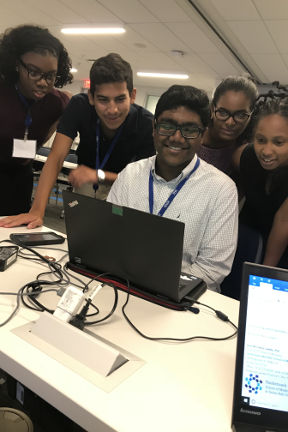Students and Faculty
Current Students and Faculty
Departments will actively search for candidates who represent academic and clinical excellence, and their pools of applicants must include women, racial and ethnic minorities, LGBT individuals, veterans, and those with disabilities. Students will understand how ethnicity, race, language, cultural, sexual orientation, and other personal characteristics affect the distribution and impact of illness and injury. Students will understand the structural barriers that contribute to persistent racial, ethnic, and cultural disparities in health outcomes.
To meet the SOM’s diversity goals, attention must be paid not only to recruitment but retention. Numerous studies have demonstrated that URiM faculty, when compared with their non-URiM peers, are more likely to experience discrimination, bias and isolation, are less likely to be promoted, experience cumulative workplace disadvantages and have unfulfilled career and leadership aspirations. It is the SOM’s responsibility to support, mentor and encourage academic advancement of minority and non-minority faculty, at all stages of their careers.
Experts agree that medical school and residency curricula must include awareness of health care disparities and instruction in “culturally effective medicine.” Curricula will necessarily include discussion of bias and stereotyping and how to combat them in health care settings. Students will learn about health, health care disparities and how ethnicity, race, language, cultural, sexual orientation, and other personal characteristics affect the distribution and impact of illness and injury. They will know how illness is perceived, how perceptions affect treatment, and how these impact the outcome of care. Students also will understand the structural barriers that contribute to persistent racial, ethnic, and cultural disparities in health outcomes. These lessons will be reinforced in the clinical years and during residency training.
Future Students and Faculty

Avinash Sookdeo and the 2018 cohort of the M.I.N.D.S. program.
Seton Hall University senior Avinash Sookdeo and the 2018 cohort of the M.I.N.D.S program. “The greatest barrier to URiM admission to medical school is the small applicant pool of URiM college graduates resulting from high attrition rates in high school and low enrollments in college.”
The administration and faculty of the SOM must develop, support, and participate in “pipeline” activities that seek to identify and encourage promising URiM students to consider a career in medicine or other health professions.
Pipeline programs – as outlined in a white paper that we authored this spring – describes our plans to promote just such contemplations in students. Pipeline activities include K-12, pre-collegiate, collegiate and post-baccalaureate programs, “shadow” experiences with heath care professionals, summer science programs, mentoring and outreach, and enrichment and recruitment activities aimed at increasing interest in, and preparation, for health sciences careers.
